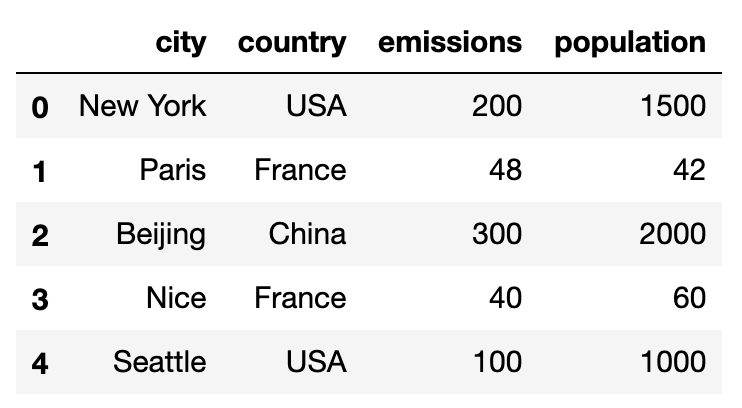Practice: Types
Contents
Practice: Types#
Consider the emissions dataset from the earlier slide. We have put an image of the dataset below as a reminder.

The following questions are all multiple-choice questions about queries on this dataset. Assume the dataset is stored in a variable named df .
Notice that in all of these questions, we are asking about the type of the value resulting from that expression, and not its dtype (the type of the values inside it).
Question 0#
What is the type of the following expression? If we stored the result of this expression in a variable, what is its type?
df['country']
Your Task
Select one option. Write your answer down in your own space.
Option 0
str
Option 1
int
Option 2
Series
Option 3
list
Option 4
DataFrame
Option 5
There is no type, this code causes an error.
Question 1#
What is the type of the following expression? If we stored the result of this expression in a variable, what is its type?
df.loc[df['emissions'] > 100, ['emissions', 'city']]
class=”far fa-edit fa-fw”> Your Task
Select one option. Write your answer down in your own space.
Option 0
str
Option 1
int
Option 2
Series
Option 3
list
Option 4
DataFrame
Option 5
There is no type, this code causes an error.
Question 2#
What is the type of the following expression? If we stored the result of this expression in a variable, what is its type?
df.loc[1, 'city':'country']
Your Task
Select one option. Write your answer down in your own space.
Option 0
str
Option 1
int
Option 2
Series
Option 3
list
Option 4
DataFrame
Option 5
There is no type, this code causes an error.
Question 3#
What is the type of the following expression? If we stored the result of this expression in a variable, what is its type?
df.loc[3, 'emissions']
Your Task
Select one option. Write your answer down in your own space.
Option 0
str
Option 1
int
Option 2
Series
Option 3
list
Option 4
DataFrame
Option 5
There is no type, this code causes an error.
